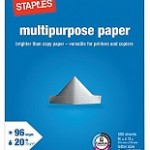 There was a lot of buzz last week about a Meijer cashier who was awarded $15,000 after she was fired for taking coupons intended for customers. Opinions are varied on whether the cashier or Meijer was in the wrong, and my response to that specific situation was published by Mlive last week.
There was a lot of buzz last week about a Meijer cashier who was awarded $15,000 after she was fired for taking coupons intended for customers. Opinions are varied on whether the cashier or Meijer was in the wrong, and my response to that specific situation was published by Mlive last week.
Regardless of what you think about that case, this seems like a good time to review the ethical use of coupons as it pertains to all us super-savers.
Here are five ways people either intentionally or unintentionally commit coupon fraud.
Selling or buying coupons
Virtually every coupon includes language stating it’s invalid if sold or transferred. These restrictions are often included to ensure coupons are used by a target market or demographic group.
However, sales clerks really have no way of knowing if a coupon has been sold or transferred so it’s an easy crime to commit. As a result, you can find plenty of coupons on eBay or being sold by coupon clipping services. Some of these sale sites might include disclaimers saying the coupons are free and the price is only to pay for the clipper’s time and effort, but the Coupon Information Corporation says adding a disclaimer doesn’t make the transaction any more legal.
Using fraudulent coupons
Every once in a while, a fabulous coupon makes the rounds on the internet. It could be one for $4.50 off Mountain Dew or $7.00 off a Pepperidge Farm product. The problem is this and many other very high value coupons are fake. If it seems too good to be true, it probably is.
These are some of the red flags that can help you spot a fake coupon.
- Coupons circulated as an attachment or .pdf link that does not appear associated with the manufacturer
- Coupons that would result in an expensive item being free at regular price
- Coupons that are not mentioned or found on manufacturer websites
- Coupons with unusually long expiration dates
When it doubt, contact the manufacturer or check the Coupon Information Corporation’s fraudulent coupon database at http://www.couponinformationcenter.com/psa-list.php.
Printing too many coupons
Printable coupons can add up to significant savings for shoppers, but manufacturers typically limit how many coupons can be printed in total as well as how many coupons can be printed by individual users. According to Coupons.com, most coupons on its site have limits of one to two prints per user.
However, some people use computer tricks to fool websites into thinking they haven’t reached their limit. Doing so is unethical, not only because it violates the manufacturer’s rules, but also because it may deprive fellow couponers from claiming their share of the savings.
Copying coupons
Likewise, it might be tempting to circumvent print limits by making copies of printables, but is it really worth committing fraud to save a couple bucks? What’s more, this type of bad behavior affects all couponers in the long run. We’re already seeing manufacturers requiring more hoops to claim online coupons, and some retailers are tightening their redemption guidelines as well.
Purposely using coupons for the wrong product
Known as UPC decoding, some unethical couponers have figured out how to work the system and use coupons for items other than the ones listed on the coupon. It might be one of the most blatant forms coupon fraud in my book and, unfortunately, one that’s speculated to have been used by at least one couponer featured on the show Extreme Couponing.
For those just getting started in couponing, the best way to avoid unintentionally committing coupon fraud is to make sure you are getting your information from a trustworthy source. At SavingsAngel, we pride ourselves on promoting only the honest use of coupons. You can also go to CouponIntegrity.com to find a list of coupon blogs that adhere to a strict code of ethics.


